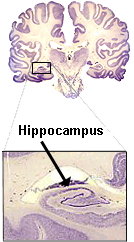 | New Neurons in Neocortex? New Study Says NO! |
 | New Neurons in Neocortex? New Study Says NO! |
|
By Ellen Kuwana Neuroscience for Kids Staff Writer December 30, 2001
The researchers used molecular markers to examine and identify different cell types in the adult brain. One marker (BrdU) tagged new cells, a second marker tagged neurons (nerve cells), and the third marker tagged glial cells (glia). Glia are cells that support nerve cells.
The scientists concluded that neurogenesis does occur in the adult primate hippocampus and olfactory bulbs, but found no evidence of new nerve cell growth in the neocortex. However, they did find evidence of new glial cells in the neocortex.
A Brief History of Neurogenesis Research In 1998,
Princeton University scientists and others announced that they had
observed neurogenesis in the hippocampus and olfactory bulbs of the
adult primate brain. The hippocampus, important for memory and learning is
an "older" part of the cerebral cortex. The olfactory bulbs are important
for the sense of smell. In 1999, the same group published work showing
that there were areas of the neocortex in adult monkeys
where new nerve cell growth occurred. Later, researchers at the
Salk Institute reported on neurogenesis in the hippocampus of adult
human brains. In 1998,
Princeton University scientists and others announced that they had
observed neurogenesis in the hippocampus and olfactory bulbs of the
adult primate brain. The hippocampus, important for memory and learning is
an "older" part of the cerebral cortex. The olfactory bulbs are important
for the sense of smell. In 1999, the same group published work showing
that there were areas of the neocortex in adult monkeys
where new nerve cell growth occurred. Later, researchers at the
Salk Institute reported on neurogenesis in the hippocampus of adult
human brains.
This work in humans strengthened the conclusions from earlier work the
earlier studies -- neurogenesis does occur in the
adult brain. The next logical challenge for scientists is to discover why and how neurogenesis occurs in the hippocampus and olfactory bulb. Then perhaps that knowledge can be harnessed to prompt new cell growth in the neocortex and other areas of the brain, which could lead to promising therapies for a variety of brain diseases. In the meantime, use what you have wisely -- it may be all you get. |
|
References:
|
| GO TO: | Neuroscience In The News | Explore the Nervous System | Table of Contents |
![[email]](./gif/menue.gif) Send E-mail |
 Get Newsletter |
 Search Pages |